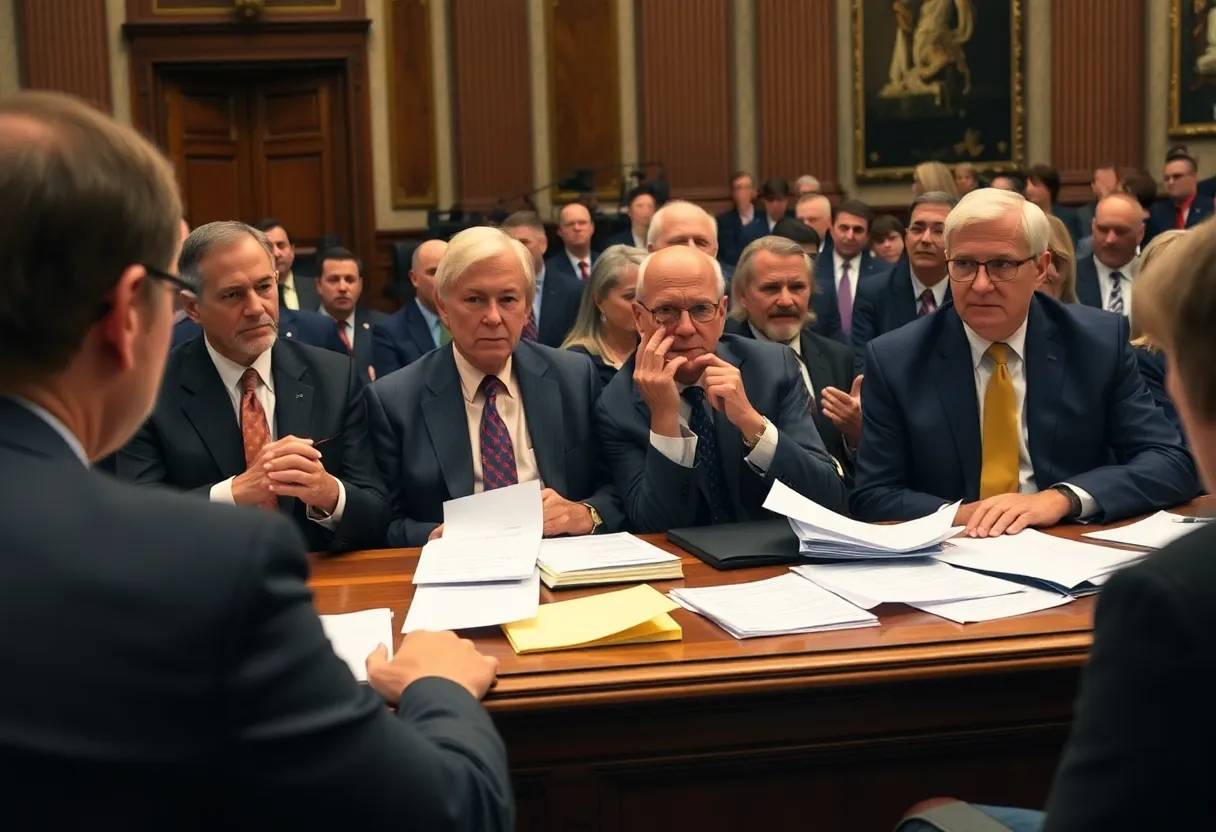News Summary
Arizona is at risk of a government shutdown as the House Appropriations Committee approved a $17 billion budget that is lower than previous proposals. Governor Katie Hobbs is expected to veto the budget, which could lead to a loss of spending authority after the June 30 deadline. The budget cuts crucial services, drawing criticism from lawmakers and raising concerns about long-term impacts on education and public safety. Tensions among Republicans and a rift in negotiations highlight the urgency for a resolution before the looming deadline.
Arizona is facing a potential government shutdown as the House Appropriations Committee passed a $17 billion budget on a party-line vote on June 24, 2025. This budget is significantly lower than the $17.6 billion plan negotiated by Democratic Governor Katie Hobbs and falls short of the $17.3 billion budget previously approved by House Republicans just a week ago. Governor Hobbs has indicated that she will veto the continuation budget, which is crucial, as it would leave the state without spending authority after the June 30 deadline.
House Speaker Steve Montenegro has expressed confidence that a government shutdown will not occur, despite mixed opinions among lawmakers regarding the budget situation. The proposed budget has been criticized for being a stripped-down version, lacking essential funding for crucial services such as education, public safety, and community resources. Some Republican lawmakers have shown resistance to any budget exceeding $17 billion, underscoring the growing friction in negotiations.
Details of the Budget Proposal
The House’s approved budget plan has been described as a “skinny” or “skeleton” budget, which fails to meet the needs of many sectors. The proposal cuts significant funding, including $12 million earmarked for community colleges and $9.5 million intended for pay raises for state troopers. Critics argue that such funding cuts could lead to long-term costs, particularly in vital areas like education and public safety.
Political Tensions and Opinions
Within the ongoing discussions, tensions among House Republicans have become evident. House Speaker Montenegro confronted GOP lawmaker David Livingston during a caucus meeting over budget priorities, reflecting a rift within the party concerning fiscal strategies. Representative Alexander Kolodin expressed concerns that the Senate may approve the House’s budget, only for it to be vetoed by Governor Hobbs, potentially resulting in a last-minute crisis as the budget deadline approaches.
House Minority Leader Oscar De Los Santos criticized the decision-making process, attributing the looming government shutdown solely to House Republicans’ actions. He emphasized that had the House allowed a vote on the Senate’s bipartisan budget proposal, it would likely have passed and helped avert the current crisis.
Implications of the Proposed Budget
Lawmakers and observers worry that this budget plan does not adequately support essential public services. The suggestions for budget cuts have raised concerns that they may ultimately lead to increased costs in the long run, especially in already strained sectors such as education and law enforcement. The lack of funding for community colleges and state trooper pay raises signifies a shift that could have broad impacts on state operations and public welfare.
The status of the Arizona budget remains precarious as the Senate is expected to vote on the House’s proposal shortly, with an anticipated veto from Governor Hobbs looming over the discussions. This deadlock illustrates the significant divides among lawmakers, particularly between House Republicans, Senate Democrats, and the Governor’s office, highlighting the urgency for a resolution before the looming budget deadline.
Background on Budget Negotiations
The current budget impasse follows extensive negotiations involving various factions within Arizona’s political landscape. The difference in funding amounts proposed by different governmental branches raises fundamental questions about priorities and fiscal responsibility. Republican leaders have advocated that the continuation budget is necessary for maintaining government operations while further negotiations take place, yet critics argue the plan falls drastically short of what is necessary to run state services effectively.
As the deadline approaches, all eyes will be on the negotiations, with the future of Arizona’s budget hanging in the balance and the significant possibility of a government shutdown exacerbating the situation.
Deeper Dive: News & Info About This Topic
- ABC15
- Wikipedia: Government Shutdown
- Arizona Mirror
- Google Search: Arizona government shutdown
- AZCentral
- Encyclopedia Britannica: State Government
- Fox 10 Phoenix
- Google News: Arizona budget 2025
- Arizona Capitol Times
- Google Scholar: Arizona government budget
- KTAR

Author: STAFF HERE PHOENIX WRITER
The PHOENIX STAFF WRITER represents the experienced team at HEREPhoenix.com, your go-to source for actionable local news and information in Phoenix, Maricopa County, and beyond. Specializing in "news you can use," we cover essential topics like product reviews for personal and business needs, local business directories, politics, real estate trends, neighborhood insights, and state news affecting the area—with deep expertise drawn from years of dedicated reporting and strong community input, including local press releases and business updates. We deliver top reporting on high-value events such as the Waste Management Phoenix Open, Cactus League Spring Training, and Arizona State Fair. Our coverage extends to key organizations like the Greater Phoenix Chamber of Commerce and Visit Phoenix, plus leading businesses in technology and healthcare that power the local economy such as Intel and Banner Health. As part of the broader HERE network, including HERETucson.com, we provide comprehensive, credible insights into Arizona's dynamic landscape.





